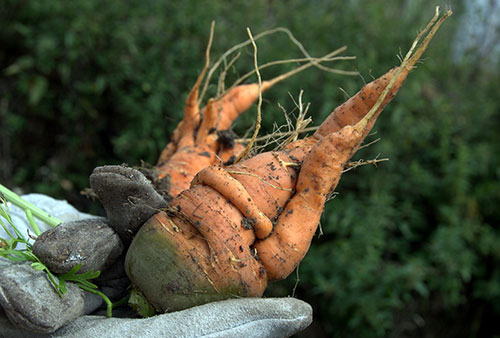The next time you go grocery shopping, don’t turn up your nose to an undersized apple or a forked carrot; they’re just as nutritious as more perfect-looking produce and they cost less.
Loblaw recently introduced a “Naturally Imperfect” produce line in some of its stores, offering up to a 30-per-cent discount to whet consumers’ appetites.
“I think the Loblaw initiative is a great move,” says Prof. Mike von Massow, School of Hospitality, Food and Tourism Management. “We know that more than half of the food that is thrown out at the household level is fruits and vegetables.” Two-thirds of that waste is avoidable, he adds.
Imperfect produce usually doesn’t make it to grocery stores because of consumer perceptions that it’s lower quality. Instead, these fruits and vegetables are often sold at farmers’ markets, used in juices or thrown out. Selling imperfect produce reduces waste and helps consumers save money.
A survey of Guelph residents by Von Massow and geography professor Kate Parizeau revealed four types of food consumers. Those who are waste conscious and the “food aware,” who are on a special diet for health reasons, tend to waste less food. The two groups with higher levels of food waste are “frantic families” with busy schedules that make it difficult to plan grocery trips and meals, and people who are “convenience driven,” who buy groceries but eat out frequently.
Consumers have grown accustomed to perfect produce because that’s what grocery stores have traditionally offered. “It’s clear that it has to do with a disconnect between us and our food,” says Parizeau. “When we grew our own food it was easy to understand that this carrot next to the ugly one grew in the same conditions. There’s nothing wrong with it.”
Von Massow says food often gets wasted because it’s no longer suitable for its original purpose, but that doesn’t mean it can’t be used for something else. Overripe bananas, for example, can be used in banana bread or smoothies.
He also recommends keeping track of the food you already have so that you don’t buy the same items at the grocery store. And don’t throw something out just because it has reached or passed its “best before” date, which is only an indication of when the product has reached its peak, not when it has expired.
The researchers partnered with the City of Guelph and York Region to analyze food waste and develop strategies to minimize it. Guelph has one of the highest diversion rates in Ontario.
“Municipalities are really interested in reducing what gets put to the curb,” says Von Massow. Composting food waste reduces its environmental impact, but it’s a costly service for cities to provide. Throwing out less food helps both consumers and cities save money.
“I often tell people that if you’re throwing 20 per cent out, and you go buy five bags of groceries, you might as well leave one at the curb because it’s going to end up there anyway,” he says. “Why double the trip?”
